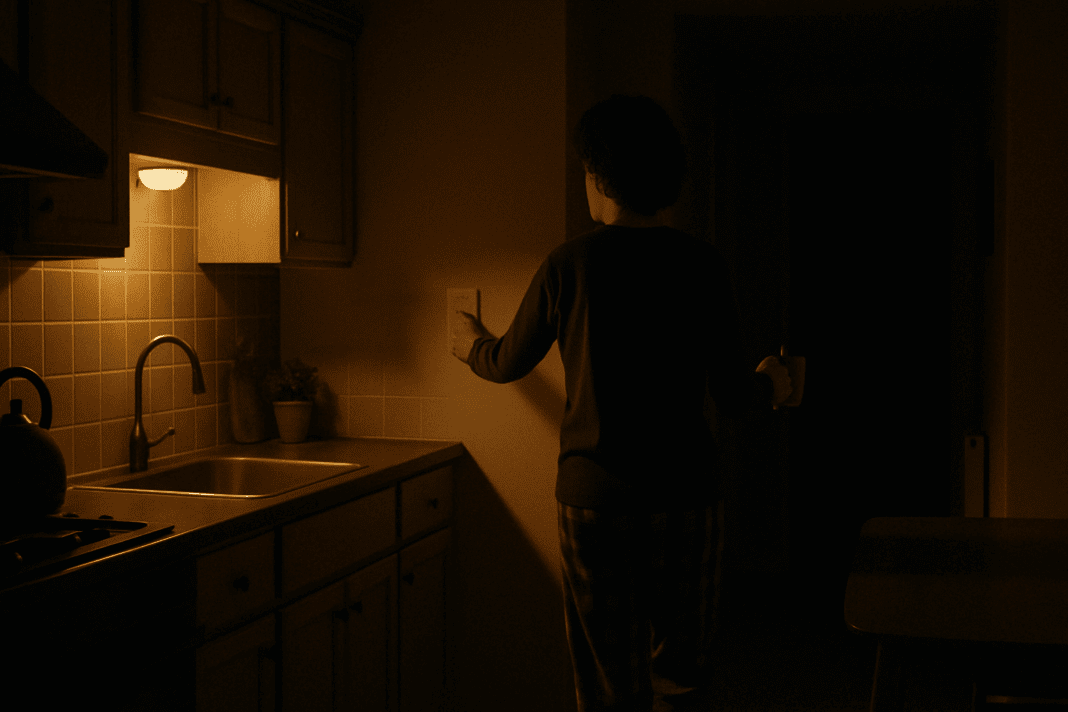Eating late at night is a habit that many people struggle with, whether it’s a post-dinner snack, a full second meal, or repeated trips to the kitchen after hours. For some, it feels like an uncontrollable cycle: they eat healthy all day, but once the sun sets, cravings strike and the willpower fades. This recurring issue can sabotage weight loss goals, interfere with digestion, disrupt sleep, and contribute to a cycle of guilt and frustration. If you’re asking yourself, “How can I stop eating at night?” or “Why do I crave food at night?” you’re not alone—and there are real answers grounded in science, psychology, and nutrition.
Understanding how to curb night eating is not about suppressing hunger with sheer willpower. It’s about getting to the root of what drives those late night cravings, whether physical, emotional, or behavioral. For many people, nighttime eating becomes a conditioned response to stress, fatigue, or unmet nutritional needs earlier in the day. Addressing the causes of nocturnal eating requires a deeper look at your body’s biological rhythms, your daily routine, and your mental and emotional cues. With a thoughtful, evidence-based approach, you can learn how to stop eating at night naturally and sustainably—no shame or fad diets required.
You may also like: Why Am I Craving Sweets All of a Sudden? Expert-Backed Reasons and How to Stop Sugar Cravings Naturally
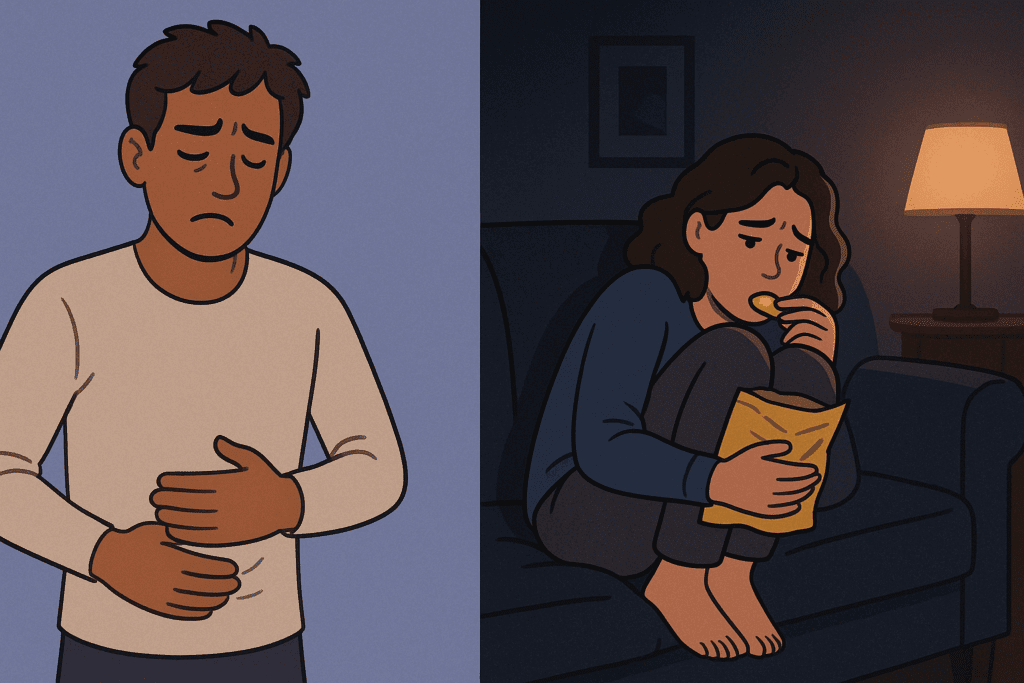
Why Do I Crave Food at Night? Understanding the Root Causes of Late Night Cravings
Late night cravings don’t emerge out of nowhere. They are often a complex interplay of biological rhythms, emotional states, and lifestyle habits. Many people experience a drop in blood sugar levels later in the day, especially if they’ve skipped meals or consumed mostly simple carbs. When your body lacks energy, it signals the brain to seek out fast sources of fuel—usually in the form of sugar or processed snacks. This is one of the most common physiological explanations for why people experience late night hunger.
However, emotional factors can be equally influential. If you’re wondering, “Why do I binge eat at night?” consider how emotions like anxiety, loneliness, boredom, or stress might be driving your behavior. Eating can serve as a temporary distraction or a soothing mechanism, especially when you’re unwinding after a stressful day. If food has become your go-to source of comfort, it’s understandable that late night cravings persist.
For some, the issue is compounded by overly restrictive dieting or a lack of proper nourishment earlier in the day. Skipping meals or drastically cutting calories can lead to a biological backlash—your body rebels by increasing appetite hormones at night. This can result in eating well beyond what your body needs, often leading to guilt and the question, “How can I stop eating late at night?” The answer often starts by fueling your body adequately during the day.
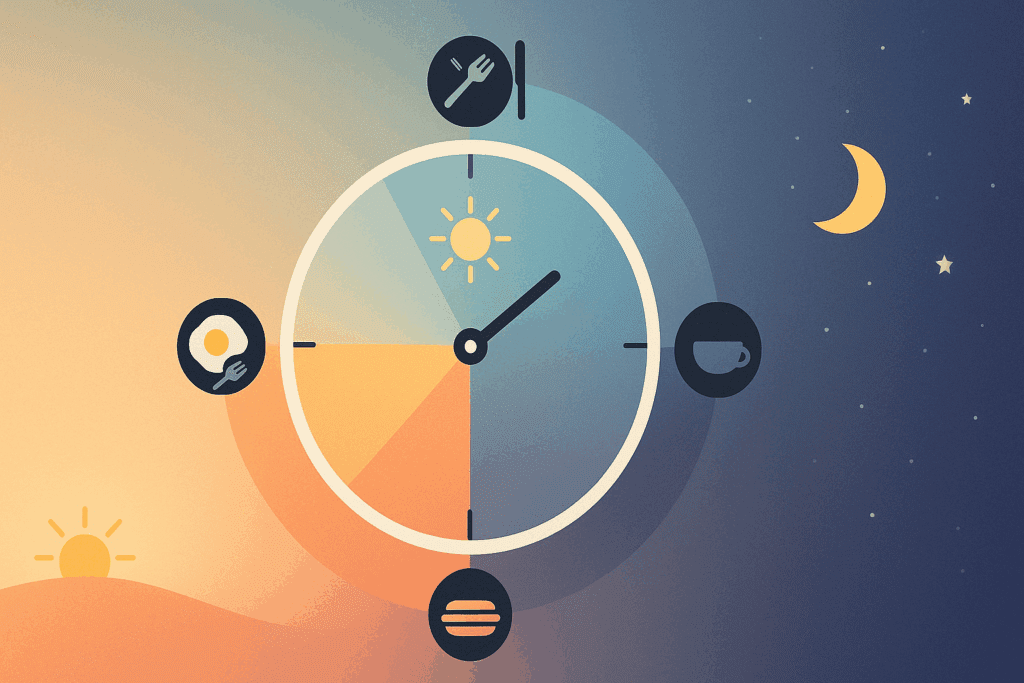
The Role of Circadian Rhythms in Nighttime Eating Habits
Our bodies are designed to follow a circadian rhythm—a natural 24-hour cycle that governs everything from sleep and alertness to hunger and hormone production. Ideally, food intake should align with the times of day when your metabolism is most active, which is typically during daylight hours. However, in modern life, many people find themselves eating large meals—or grazing—late into the evening, long after their biological “eating window” has closed.
This misalignment can create a cascade of problems. Eating late at night when the body is preparing for rest can impair digestion, reduce insulin sensitivity, and increase fat storage. This is one reason why night time cravings can feel so disruptive: they go against your body’s natural rhythms. When you ask, “How to stop cravings at night?” part of the solution lies in resetting your internal clock.
Exposure to artificial light in the evening, particularly from phones and TVs, can delay melatonin production—the hormone that signals it’s time to sleep. This delay may inadvertently increase cravings and appetite as the body thinks it’s still daytime. To better understand how to avoid eating at night, it’s helpful to reduce screen time in the evening and structure meals to wind down earlier. When your eating patterns are in harmony with your circadian rhythm, cravings tend to decrease naturally.

How Night Eating Syndrome Affects Your Health and What You Can Do
In some cases, nighttime eating is more than just a habit—it can become a diagnosable condition known as Night Eating Syndrome (NES). This disorder is characterized by eating more than 25% of daily calories after dinner or waking up to eat during the night at least twice per week. People with NES often feel out of control around food in the evenings and experience insomnia or mood disturbances.
If you’ve been wondering, “Why do I binge at night even when I’m not hungry?” it may be worth evaluating whether NES is playing a role. Night eating syndrome treatment often involves a combination of cognitive behavioral therapy (CBT), sleep hygiene improvements, and sometimes light therapy or medications to address serotonin imbalances. For many people, identifying and treating NES is the breakthrough they need to stop eating in the middle of the night and restore healthier patterns.
The condition is not a reflection of weakness or poor character. Rather, it’s a physiological and psychological response to stress, disrupted circadian rhythms, or emotional dysregulation. Addressing these root causes can help reduce cravings and improve overall health. If you suspect NES, working with a therapist or registered dietitian can provide you with the tools and support to make meaningful progress.

Rebuilding Your Daytime Routine to Support Better Evenings
One of the most effective ways to prevent night time cravings is to optimize what—and when—you eat during the day. A well-balanced diet that includes adequate protein, healthy fats, fiber, and complex carbohydrates supports blood sugar stability and satiety. When your meals are satisfying and nutritionally complete, you’re far less likely to experience overwhelming hunger later in the evening.
Many people make the mistake of eating too little during the day, believing it will help with weight loss. But this restriction often backfires. The body, in its wisdom, seeks balance—and that can mean increased hunger and intense cravings at night. If you’re frequently wondering how to stop eating at night, look at your breakfast and lunch. Are they satisfying and nutrient-dense? Do they provide enough energy to get you through the day?
Creating a consistent meal schedule also helps regulate appetite hormones. Rather than eating at random times or skipping meals, aim to eat every 4–6 hours to maintain energy and avoid blood sugar crashes. This structure can help signal to your body that food is plentiful and predictable, making it easier to avoid night snacking.
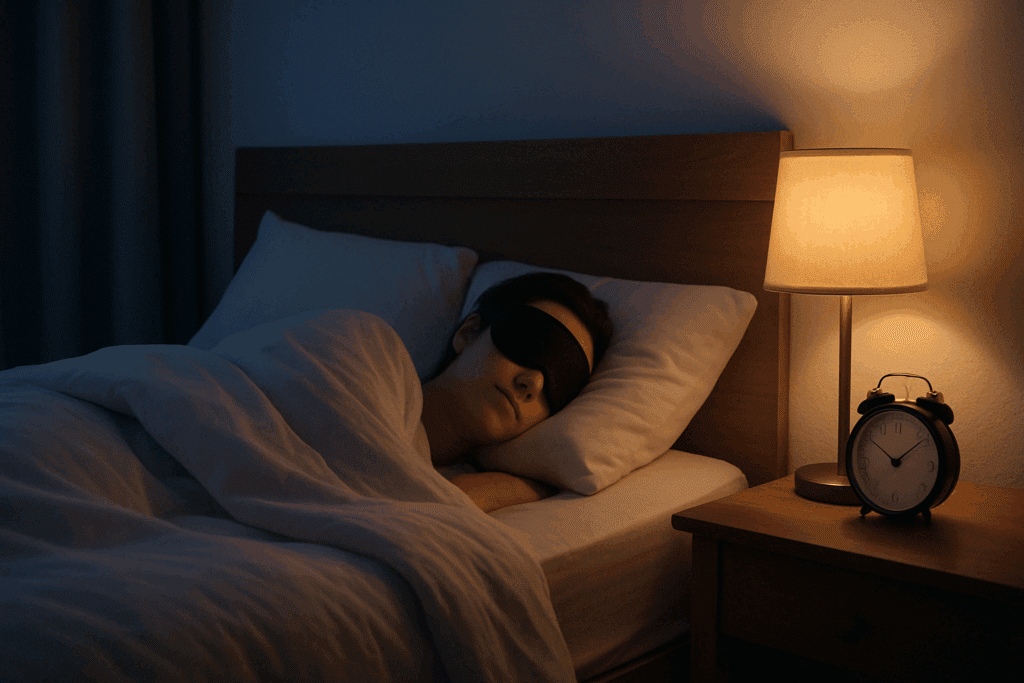
Sleep Hygiene and Its Surprising Role in Hunger Regulation
Sleep and appetite are deeply intertwined. Poor sleep increases levels of ghrelin (the hunger hormone) and reduces levels of leptin (the satiety hormone), creating the perfect storm for increased cravings—particularly for high-carb, high-fat foods. If you’ve ever had a sleepless night followed by a day of intense cravings, you’ve experienced this hormonal imbalance firsthand.
Improving sleep quality can be one of the most effective ways to stop late night eating. Establishing a consistent bedtime, limiting caffeine intake after 2 p.m., and reducing screen exposure before sleep can all enhance melatonin production and support deeper, more restorative rest. Even something as simple as dimming lights an hour before bed can signal to your body that it’s time to wind down.
If you’re struggling with how to control hunger at night, consider your sleep routine. Are you going to bed at the same time each night? Are you getting at least 7–8 hours of sleep? Often, what feels like a food issue is actually a sleep issue in disguise. Prioritizing rest can reduce late night cravings significantly and help restore balance to your hunger cues.

Addressing Emotional Eating and Stress-Driven Cravings
For many people, food serves as a coping mechanism—something that brings comfort or distraction when emotions become overwhelming. After a long, stressful day, the quiet of night can bring unresolved feelings to the surface. Eating becomes a way to numb or soothe those feelings, even in the absence of physical hunger. Recognizing this pattern is the first step toward change.
When you feel the urge to snack at night, pause and ask yourself, “What am I really feeling?” Sometimes the answer is stress. Other times, it might be loneliness, fatigue, or even boredom. Naming the emotion helps reduce its power and allows you to choose a different response. Instead of automatically turning to food, try journaling, stretching, deep breathing, or talking to a friend. These alternatives can fulfill the same emotional need without derailing your health goals.
Over time, practicing this pause can become a habit. When you consistently meet your emotional needs with non-food tools, the drive to eat late at night begins to fade. This is how to curb cravings at night—by replacing old, unconscious patterns with new, mindful ones that support true wellbeing.
Creating Healthy Boundaries Around Nighttime Eating
One powerful strategy for how to avoid night snacking is setting a clear, compassionate boundary around evening food intake. This doesn’t mean rigid rules or punishing restrictions. Instead, it’s about creating a routine that signals to your body and mind that the eating window is closed for the day. For example, you might establish a “kitchen curfew” where the last meal or snack is finished by 8:00 p.m.
This boundary can be reinforced by environmental cues, such as turning off kitchen lights, brushing your teeth, or sipping a calming tea. These rituals help anchor the idea that the day’s eating is complete. If you do find yourself craving food late at night, check in with yourself first. Are you truly hungry, or is it a craving? If it’s the latter, engage in one of your non-food nighttime rituals instead.
Boundaries also extend to your thoughts. Avoid labeling foods as “bad” or feeling guilt for previous nighttime eating. These thoughts create shame, which only fuels more emotional eating. Instead, affirm your goals and remind yourself that each choice is an opportunity to support your health—not a test of willpower.
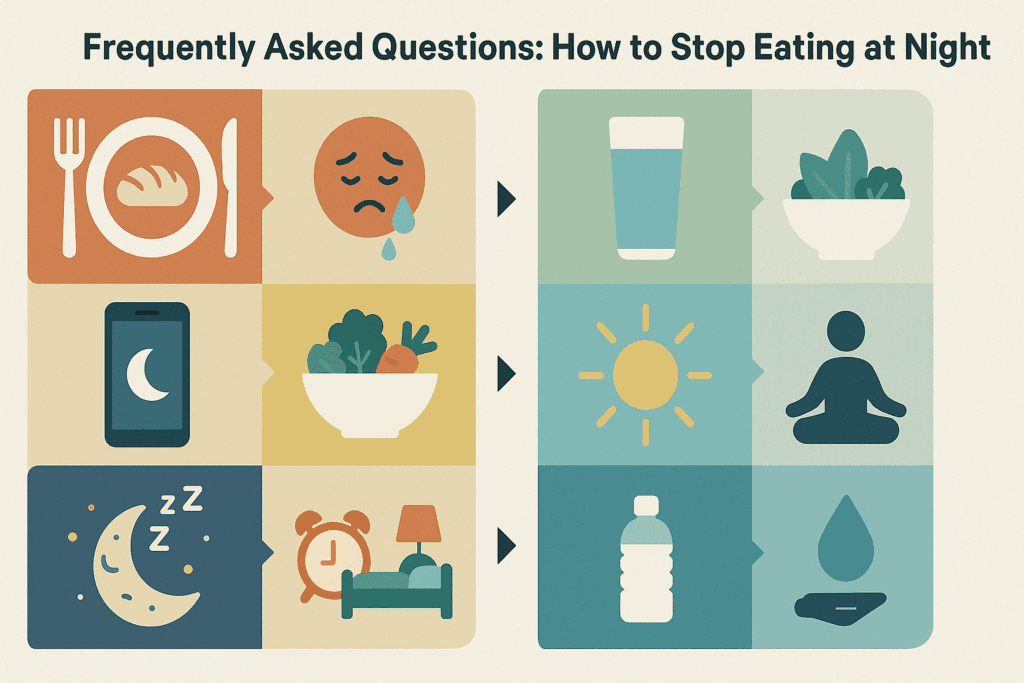
Frequently Asked Questions: How to Stop Eating at Night
1. How can mindful movement help reduce late night cravings? Gentle physical activity such as evening yoga or stretching can help regulate cortisol and reduce the likelihood of emotional eating at night. When you’re asking how to curb night eating, it’s worth exploring how movement affects neurotransmitters. Physical activity boosts serotonin and endorphins, helping to combat the emotional triggers behind late night cravings. Unlike intense workouts that can disrupt sleep, mindful movement supports both stress relief and hormonal balance. When combined with breathwork or meditation, it can significantly reduce night time cravings and shift focus away from food.
2. Can dehydration mimic late night hunger? Yes, dehydration is a lesser-known but surprisingly common cause of late night cravings. Many people misinterpret thirst signals as hunger, especially in the quiet hours of the night. If you’re wondering how to stop eating at night, start by drinking a full glass of water and waiting 10–15 minutes before reaching for a snack. Hydration can help reduce the frequency of night time cravings and prevent unnecessary caloric intake. Keeping a water bottle by your bed is one small habit that can make a big difference when you’re trying to stop late night eating.
3. What role does meal composition play in curbing late night eating? Beyond timing, the quality and composition of your meals are critical to controlling hunger at night. Meals rich in protein and fiber help stabilize blood sugar and delay the onset of hunger, reducing the likelihood of night snacking. If you struggle with how to avoid eating at night, consider adding more plant-based proteins like lentils or quinoa to your lunch and dinner. These foods have a high satiety index and also support digestive health, which plays an indirect role in controlling cravings. Balanced meals throughout the day create metabolic stability that helps you curb cravings at night.
4. Are certain personality traits linked to late night hunger? Emerging research suggests that impulsivity, perfectionism, and high neuroticism are personality traits more closely associated with binging behaviors, especially at night. People who are highly self-critical may restrict food during the day, only to binge later out of emotional exhaustion. This sheds light on the psychological causes of nocturnal eating, helping us move beyond just dietary interventions. Strategies like cognitive restructuring or guided journaling may be particularly effective for individuals with these traits who are trying to figure out how to avoid binging at night. Personality-informed approaches add nuance to standard nutrition advice.
5. How can gut health impact night eating behavior? The gut-brain axis is a powerful pathway that connects digestive health to emotional regulation and appetite. Poor gut health can disrupt the production of neurotransmitters like serotonin, which in turn affects cravings and mood stability. If you’re struggling with how to stop cravings at night, addressing gut dysbiosis through probiotic-rich foods or supplementation may be a key step. Fiber intake also supports short-chain fatty acid production, which has been shown to reduce inflammation and promote fullness. Optimizing gut health may help decrease night eating impulses from the inside out.
6. What social or environmental cues might trigger night eating? Late night hunger often has less to do with physical need and more to do with environmental associations—like watching TV with snacks or scrolling social media in bed. These cues create subconscious connections between certain activities and eating, making it harder to control cravings at night. If you find yourself stuck in a craving night loop, try modifying the context: change rooms, turn off the lights in the kitchen, or end your evening with a hot shower instead of a snack. Environment-based habit redesign is one of the most effective behavioral tactics for how to stop food cravings at night.
7. Can working night shifts lead to more severe forms of night eating? Yes, shift workers are at a significantly higher risk for night eating syndrome due to circadian misalignment. Working against your biological clock alters appetite hormones and often disrupts the sleep-wake cycle, increasing late night hunger. For those asking how to stop eating in the middle of the night or how to stop late night cravings, adjusting meal timing to match wake hours rather than the external clock may help. Night eating syndrome treatment in shift workers often involves light therapy, scheduled meals, and structured sleep hygiene. Personalized interventions are key.
8. Is there a link between magnesium deficiency and night cravings? Magnesium plays a vital role in calming the nervous system and supporting sleep. A deficiency may increase restlessness and sugar cravings in the evening, adding another layer to the causes of nocturnal eating. For those looking into how to avoid night snacking, increasing magnesium-rich foods like dark leafy greens, pumpkin seeds, or even a low-dose supplement could make a notable difference. Magnesium also supports insulin sensitivity, which helps stabilize blood sugar during the night. Addressing nutritional gaps is often a missing piece in how to stop late night eating.
9. How do emotional boundaries influence late night binging? Setting emotional boundaries can reduce stress-driven eating by helping you separate food from coping mechanisms. If you often find yourself overwhelmed and thinking, “Why do I binge eat at night?”, it may be that food has become a placeholder for unmet emotional needs. Creating space for regular self-check-ins, establishing digital curfews, or seeking therapy for unresolved stress can reduce your reliance on food for emotional regulation. These boundaries not only help you avoid binging at night but also improve your overall quality of life. The better your emotional boundaries, the less likely you are to fall into the cycle of night time cravings.
10. Can tech solutions support behavior change around night eating? Yes, digital health tools are increasingly used to monitor, support, and interrupt disordered eating behaviors. Apps that track hunger cues, mood patterns, and sleep hygiene can offer real-time insight into when and why late night hunger strikes. Some even include mindfulness prompts or breathing exercises to help you manage cravings. These innovations can be especially useful for those wondering how to curb night eating in a data-driven, personalized way. Technology is not a substitute for therapy, but it can be a valuable aid in your journey to stop eating at night and reclaim your evenings.
Conclusion: Reclaim Your Evenings and Build a Healthier Relationship with Food
If you’ve ever felt frustrated, stuck, or ashamed about your late night eating habits, know that you are not alone—and you are not without solutions. Learning how to stop eating at night is not about eliminating pleasure or practicing strict self-denial. It’s about understanding your body’s rhythms, meeting your emotional needs, nourishing yourself consistently, and creating a supportive environment that fosters balance and peace.
Whether you’re seeking answers for how to avoid eating at night, how to stop food cravings at night, or how to stop eating in the middle of the night, the strategies explored in this guide can help you take back control in a sustainable, compassionate way. Start small. Notice your patterns. Honor your hunger—but also your emotions. When you align your habits with your health goals and make space for rest, structure, and nourishment, you’ll find it much easier to say goodnight to unnecessary snacking.
Was this article helpful? Don’t let it stop with you. Share it right now with someone who needs to see it—whether it’s a friend, a colleague, or your whole network. And if staying ahead on this topic matters to you, subscribe to this publication for the most up-to-date information. You’ll get the latest insights delivered straight to you—no searching, no missing out.
Further Reading:
7 Easy Ways to Curb Your Nighttime Snack Cravings
10 Clever Ways to Stop Eating Late at Night
19 Terrific Ways to Stop Food Cravings; Science-Backed!
Disclaimer
The information contained in this article is provided for general informational purposes only and is not intended to serve as medical, legal, or professional advice. While NewsHealthWatch strives to present accurate, up-to-date, and reliable content, no warranty or guarantee, expressed or implied, is made regarding the completeness, accuracy, or adequacy of the information provided. Readers are strongly advised to seek the guidance of a qualified healthcare provider or other relevant professionals before acting on any information contained in this article. NewsHealthWatch, its authors, editors, and contributors expressly disclaim any liability for any damages, losses, or consequences arising directly or indirectly from the use, interpretation, or reliance on any information presented herein. The views and opinions expressed in this article are those of the author(s) and do not necessarily reflect the official policies or positions of NewsHealthWatch.

